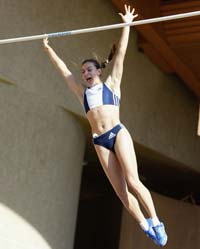The Black Sea Cossacks choir backed by a full orchestra lent an exotic twist to the Brussels Golden League meeting in the week after the Athens Olympics.
To the delight of a noisy crowd who had enjoyed some splendid athletics, including two world records, the choir were joined on stage by Russian pole vaulter Yelena Isinbayeva, who belted out an enthusiastic version of her national anthem.
 Isinbayeva had set her seventh world record of the year while winning the gold medal in Athens. In Brussels she extended her mark another centimetre to 4.92 metres and picked up another $100,000 bonus.
Isinbayeva had set her seventh world record of the year while winning the gold medal in Athens. In Brussels she extended her mark another centimetre to 4.92 metres and picked up another $100,000 bonus.
"I'm just a poor girl from Volgograd," she disarmingly explained to reporters before the start of the Olympic Games.
The women's pole vault is still a fledgling event and Isinbayeva confessed at the season-ending world athletics final that she had already exceeded five metres in training.
After making a fortune in world record bonuses, some of which went towards buying a new car, Isinbayeva was considerably richer at year's end and indisputably the women's athlete of the year.
Her unexpected concert appearance in Brussels reflected her vivacious personality, already clearly apparent when performing in the most theatrically spectacular event on the athletics programme.
BALCO INQUIRY
Athens showcased the old and the new with the core sport of the Games fully living up to its exalted status. It also provided a welcome respite from the BALCO scandal, which had threatened to wreck track and field.
| |||||||||||
However, it clearly affected Marion Jones, winner of three gold medals at the 2000 Sydney Games.
Jones's partner Tim Montgomery, the world 100 metres record holder, was investigated and eventually charged with serious doping violations as a result of the BALCO inquiry.
Montgomery failed to makes the Games' team and Jones, who was also investigated, qualified for the relay and long jump only, eventually leaving Athens without a medal of any colour.
Drugs scandals again scarred the Games, although there is credible evidence that the testers are starting to catch up with the cheats.
The home country's leading medal hopes Costas Kenteris, the Sydney 200 metres champion and Katerina Thanou, the 100 silver medallist behind Jones in Sydney, withdrew after missing a scheduled drugs test on the eve of the opening ceremony.
Russian Irina Korzhanenko tested positive after winning the first athletics gold of the Games, the women's shot put in Ancient Olympia. Hungarian men's hammer champion Adrian Annus and his team mate Robert Fazekas, the discus champion, were also stripped of their gold medals for doping violations.
EL GUERROUJ TRIUMPH
On a brighter note, Athens proved a triumph for the great Moroccan Hicham El Guerrouj, hitherto the undisputed master of the 1,500 in every arena apart from the Olympics.
El Guerrouj fell at the bell at the 1996 Atlanta Olympics and was outsprinted in the straight four years later in Sydney.
He rebounded in Athens, pouncing after two laps of the 1,500 and out-pacing his closest rival Bernard Lagat of Kenya to win his first Olympic gold.
On the penultimate day of the Games, El Guerrouj completed the first 1,500-5,000 Olympic double since Paavo Nurmi at the 1924 Paris Games.
El Guerrouj defeated 10,000 champion Kenenisa Bekele, denying the Ethiopian the opportunity to complete what would have been the finest year by a distance runner.
At the tail end of the European winter Bekele won the men's long and short course races at the world cross-country championships for the third time. No other man has done it once.
He then broke Haile Gebrselassie's world indoor 5,000 metres record and went on to break his great compatriot's outdoor marks over 5,000 and 10,000 at the start of the outdoor season.
Faced with the dilemma of choosing between El Guerrouj and Bekele as male athlete of the year, the world governing body resolved the problem adroitly.
Bekele's sheer weight of achievement won him the athlete of the year award, El Guerrouj's two gold medals were recognised as the performance of the season.
Britain's Kelly Holmes, haunted by injuries over the years, was deemed to have produced the women's performance of the year with her unexpected 800-1,500 double in Athens.
At the age of 34, Holmes ran a perfectly judged race to win the 800. She won a second gold in the Games' classic middle-distance race, with another masterly display of speed, stamina and mental agility.








 © 2025
© 2025